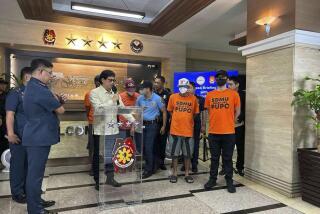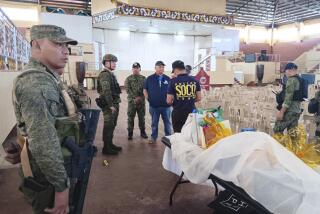Manila Tightens Security After Blast
- Share via
MANILA — Bomb-sniffing dogs patrolled rail station entrances and Philippine police randomly searched vehicles as officials stepped up security Saturday, a day after two people on a suburban Manila bus were killed in the fourth of a recent series of terrorist blasts.
President Gloria Macapagal Arroyo appealed for calm in a national radio and television address, saying the Philippines wouldn’t be bullied by terrorists.
Arroyo’s office announced stricter security measures, including random checks of vehicles, malls and other public places, and the deployment of 1,700 police trainees.
The national police chief, Hermogenes Ebdane, said investigators are trying to reassemble the device used in the bus blast. A cell phone was being tested for traces of nitrates.
According to police intelligence chief Rodolfo Delfin, passengers said that just before the blast a woman and a man got off the bus and a cell phone rang. Authorities have a sketch of a man in his 20s described as a “potential suspect,” Ebdane said. No one has claimed responsibility.
Officials announced one success Saturday: the arrest of a leader of the Muslim extremist group Abu Sayyaf who allegedly was involved in the kidnappings of Western tourists from the Sipadan diving resort in neighboring Malaysia two years ago.
Mark Bolkerin Gumbahale, 21, also allegedly colluded with Indonesians linked to Jemaah Islamiah, a Southeast Asian Muslim group suspected of ties to Al Qaeda, in a wave of bombings in Manila on Dec. 30, 2000.
Gumbahale, also known as Abu Pula and Dr. Abu, was arrested Thursday in the Manila suburb of Taguig, police said.
More to Read
Sign up for Essential California
The most important California stories and recommendations in your inbox every morning.
You may occasionally receive promotional content from the Los Angeles Times.













